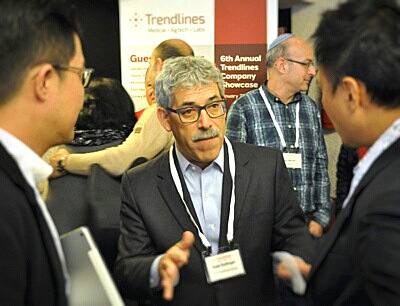IN A RARE event, shareholders of a Singapore listed company will get to vote on its newly-crafted compensation policy for its directors and senior executives.
The Trendlines Group, an incubator for start-ups in the medical and agricultural fields, is holding a Special General Meeting on 2 August in Singapore for this purpose.
The Israel-based company is required to do so under Israeli law (though not under Singapore law) within nine months of its listing.
 "If a manager achieves his or her work objectives but the company does not reach certain objectives, we may not pay bonuses. It's not just about individual performance but also the company's overall performance." "If a manager achieves his or her work objectives but the company does not reach certain objectives, we may not pay bonuses. It's not just about individual performance but also the company's overall performance."-- Steve Rhodes (photo), Co-Chairman and Co-CEO of Trendlines Group. NextInsight file photo. |
Certainly, the practice in itself is a significant facet of good corporate governance. "It's a different level of transparency than what Singapore shareholders are used to," noted Steve Rhodes, Co-Chairman of Trendlines, in a telephone interview last Friday with NextInsight.
The Trendlines compensation policy provides a general framework and guidelines for decisions regarding the terms of office and employment of executives and directors.
Areas it covers includes fixed remuneration, bonuses, equity compensation, and retirement or termination payments.
The policy was crafted with the help of Trendlines' lawyers and external compensation consultants, taking into account relevant market practices in Israel. It was considered and approved by Trendlines' remuneration committee comprising independent directors.
Mr Rhodes said: "It should be emphasised that the policy is written more broadly than the actual compensation plan. This is so the board has some flexibility in establishing the actual compensation."
Another important point is that, irrespective of the compensation policy and plan, bonuses recommended by the board for Trendlines' Chairmen/CEOs (ie Steve Rhodes and Todd Dollinger) will need to be approved by shareholders at the AGM (which is in line with the practice of all Singapore-listed companies).
How does the compensation policy align management's interest with shareholders'?
"If a manager achieves his or her work objectives but the company does not reach certain objectives, we may not pay bonuses. It's not just about individual performance but also the company's overall performance," said Mr Rhodes.
| Trendlines Group | |
| Stock Price | 19.1c |
| Market Cap (S$M) | 97.17 |
| % Change vs IPO Price^ | - 42% |
| Dividend Yield | - |
| Price/Portfolio Value* | 0.89 |
| Source: SGX Stockfacts (data as of 14 Jul) ^ Listed on SGX Catalist Board on 26 Nov 2015 * Based on market cap as at 19 Feb 2016 divided by last available portfolio value |
|
("Managers" refers to certain senior executives of the group, not the CEOs of the 48 portfolio companies as they have compensation structures that pertain specifically to their performance.)
Neither do exits -- which are divestments of Trendlines' stakes in its portfolio companies -- guarantee bonuses. The overall company objectives would still have to be met -- in other words, shareholders' interest is paramount.
Another intended outcome of adopting a compensation policy is to attract and retain high-quality management in Trendlines.
If the compensation policy were applied to FY15, would the remuneration of the two Chairmen/CEOs be substantially different?
Mr Rhodes replied: "It would not be substantially different."
| ♦ How Trendlines Chairmen will earn their 2016 bonus |
|
Unlike many listed companies, Trendlines in its FY15 annual report provided specific figures (instead of broad salary bands) for the remuneration paid to its Chairmen/CEOs and senior management. That's another positive for transparency. |
Details of the compensation policy and other matters can be found in Trendlines' circular to shareholders.








